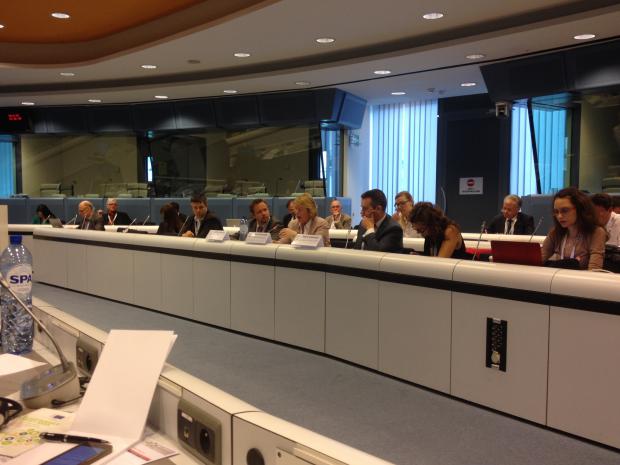European Sustainable Energy Week- District Energy Session
Discussion details

UNEP participated at the EU Sustainable Energy Week Policy Conference from 16 to 18 June in Brussels, an event organized by the European Commission every year attracting over 2700 participants. This year the overall theme was the role of responsible consumers in the new Energy Union.
Besides an information stand displaying some of the organization’s work to promote resource efficiency and sustainable consumption and production (SCP) in both developed and developing countries, UNEP organized with Euroheat & Power the panel discussion “ District Energy in Cities: From EU Vision to Local Action through an Integrated Approach".
Moderated by the European Policy Centre Senior Advisor Mark Johnston, the session began with an introduction by UNEP Brussels Head of Office Ulf Bjornholm on the significance of the event to boost the energy agenda on the European front.
Then, EC/DG ENER Director Marie Donnelly focused on EU energy policy and how it is increasingly aiming at lowering consumption patterns in order to establish energy efficiency as Europe’s ‘first fuel’. However, she believes that in order to initialize this transition and create concrete heating and cooling policies, we will require more information gathering on consumption levels. Finally, Mrs Donnelly stressed the importance of citizens’ engagement on this front, calling for an increased effective communication.
Euroheat and Power Managing Director Paul Voss began by presenting the Global District Energy in Cities Initiative as well as its Report, which are planning to accelerate the transition to low- carbon and climate resilient societies through modern district energy systems. He went on commending the UN- more specifically UNEP- work and efforts on improving energy efficiency, emphasizing the SE4ALL initiative, an ‘accelerator platform’ to develop district energy systems.
Adversely, Aalborg University Professor David Connelly focused on energy’s nature, describing it as being intrinsically a system and not a sector, with heating and cooling as its indispensable components. He then presented the Stratego Project explaining that we must quantify the impact of energy efficiency at national level in the heating and cooling sectors.
Deutsche Bank AG Vice President Zarpana Signor introduced the European Energy Efficiency Fund (EEEF), which is an innovative public-private partnership dedicated to mitigating climate change through market based financing in the member states of the European Union. The beneficiaries of the fund are both local and regional authorities as well as public and private sectors. She then stressed that € 265 million are provided by the European Commission, the European Investment Bank, Cassa Depositi e Prestiti and Deutsche Bank to support renewable energy, energy efficiency and urban transport and that around € 20 million are specifically set aside for kick-start projects.
Finally, Ecofys Managing Consultant on Energy Efficiency Thomas Boermans discussed Energy Efficiency and the future of district heating. He displayed Energy Efficiency and district heat as a ‘winning combination’ as it supplies more high efficient buildings with less energy in dense city areas and makes heat connection a service.
Log in with your EU Login account to post or comment on the platform.